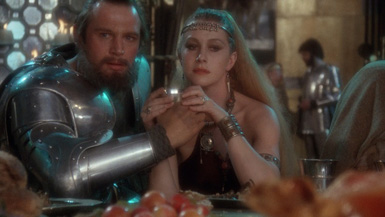|
|
Viking Night: ExcaliburBy Bruce HallOctober 7, 2015
And if you’re the kind of person who likes a movie to make sense, this is the problem you’ll have with Excalibur. All of these characters seem arbitrarily doomed to their fates, making (or not making) wise or stupid decisions not of their own volition, but because they feel they HAVE to. There are few heroes in this story; both good and evil characters come to rely on the actions of others to define them. This is meant to be the story of Arthur’s journey from a wide-eyed young boy to a wisened old king, but for most of the movie he sits idly by and delegates his fate - and the fate of the Kingdom - to the decisions of the people around him. “I've lived through others far too long!” Arthur declares at the high point of the film, and you can’t help but agree with him at that point. But bear in mind, this story IS based on a 15th century myth, and stories of that age were typically constructed as extended fables, meant to illustrate a simple moral lesson by making you sit through hours of exposition and flowery dialogue. In this story, Arthur and his contemporaries seem well aware of their status as myth and they act as such. The words they speak sound less like things people would actually say, and more like ancient etchings inscribed on stone tablets. Their actions are largely symbolic, driven by the unseen hand of fate rather than free will, all for the express purpose of making a moral point about their King’s intellectual development. And their world is a tableau patched together with pages from the Book of How to be a Good Person and Not Let Your Friends Down.
|

|
|
|

|
Thursday, April 25, 2024
© 2024 Box Office Prophets, a division of One Of Us, Inc.


